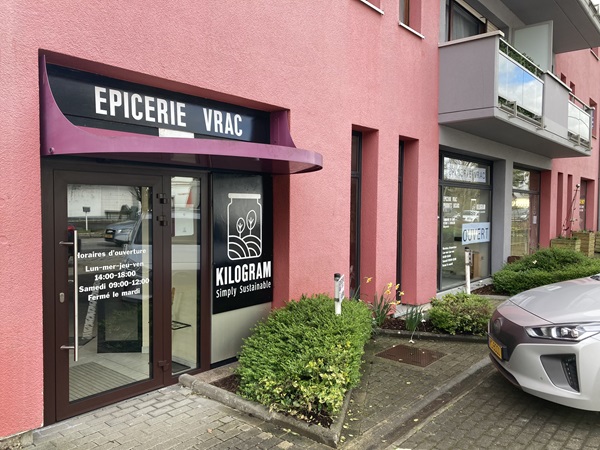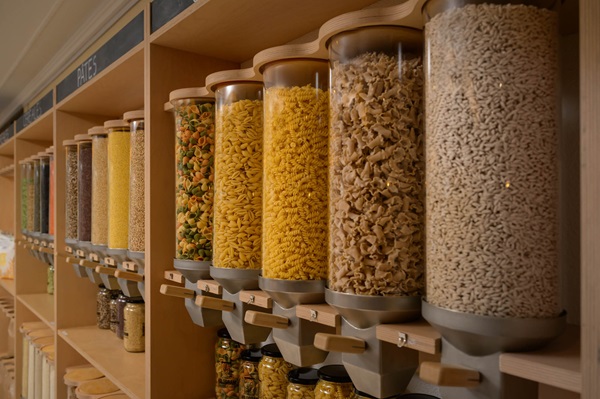 Credit: Kilogram
Credit: Kilogram
On the occasion of 30 March, International Day of Zero Waste, Chronicle.lu spoke to Stéphanie Lamberty, the founder of “Kilogram”, a Capellen-based shop for zero waste consumption.
Kilogram, originally an online shop, has recently taken a major step forward with the opening of its first grocery shop in Capellen on Friday 8 March 2024. The Kilogram venture began in April 2022, with the launch of Luxembourg's first eco-responsible e-shop, offering around a hundred products from 40 local producers.
Since March 2023, Kilogram has been displaying its SIS accreditation - Société d'Impact Sociétal - with a corporate purpose focused on promoting more responsible consumption. Initially present only online with its e-shop kilogram.lu, the chain opened its local grocery shop a year later, supported in part by the Œuvre Nationale de Secours Grande-Duchesse Charlotte.
Stéphanie Lamberty, the founder of Kilogram, discussed the transition from an online platform to a physical store, driven by customers' desire to see the products before purchase. She highlighted the importance of building relationships with clients to support them on their sustainable journey, catering to various starting points in zero waste efforts, whether in the kitchen, bathroom or elsewhere. “I started with food myself, so that's what also pushed me to make Kilogram more of a food-oriented business,” she noted.
According to Stéphanie Lamberty, Kilogram's new grocery store aims to serve as a hub for advancing the mission of promoting zero-waste consumption. Lamberty envisions its future as a welcoming space for workshops, tastings and product presentations by local producers, facilitating community engagement and the transfer of knowledge on eco-friendly practices. The shop’s physical presence aims to improve the customers’ experience by facilitating the interaction with and exploration of sustainable products.
The store's emphasis is on local, organic and packaging-free products. Stéphanie Lamberty outlined her careful selection process for suppliers, explaining that she is prioritising those within a 50km radius and aiming to ensure “clean” and “pesticide-free production methods”. She elaborated: “On the organic axis, we are not 100% organic. We are not organic extremists. Because in fact - and our customers say this too – [...] the local aspect is also very important. The majority of the range will still be organic at Kilogram, and if [not], it's regenerative agriculture, or like the producer one km away from us, it's not certified organic but we absolutely wanted to have it in store. The apple chips from the HMC League, a cooperative which produces with people with disabilities right in front of us in Capellen[...]. It makes so much sense to work with them...They are our neighbours. [...] I still check with the producers if they are in regenerative agriculture if they are not organic, what their production methods are. For me, it is still very important that it is clean and pesticide-free. We hear every day about the impacts of chemical pesticides on our health. [...]”
This search for products extends to European sourcing when local options are unavailable, but Stéphanie Lamberty noted how often, lentils in supermarkets may come from Canada and quinoa from far-off countries such as Bolivia. The quinoa sold at the Kilogram store comes from Belgium and is “less expensive than organic quinoa from Cactus”. Certain items unavailable in Europe, such as dried fruits like dates, cashew nuts and basmati rice, for instance, will be obtained from producers further away. However, the emphasis for Kilogram remains on providing over half of their products from European countries and local producers.
Stéphanie Lamberty noted: “It's very important to offer an alternative to people who have it either 'all figured out' already and who are just looking for a simple way to find a place with several products that meet these [eco-conscious] criteria and also to encourage people who are still going to the supermarket to dedicate at least part of their budget to responsible consumption.” She added that the idea for Kilogram was not to have a vast variety of choice, but to have a focus on sustainability and curated quality products that she selects herself, thereby facilitating the task for customers.
The Kilogram founder also discussed how she anticipates the 2025 regulatory changes set to align with zero-waste principles, noting that single-use containers will no longer be allowed in restaurants. “I think that there will necessarily be a package of laws for supermarkets,” she added, emphasising the need for “laws that go further” to combat the excess waste and packaging that supermarket consumption generates. Quoting a statistic published by The French Agency for Ecological Transition (ADEME), she stressed that an established zero-waste store will avoid up to a tonne of packaging waste. “I think at [Kilogram’s] current size, we must be [achieving] half of that.”
Stéphanie Lamberty added that Kilogram's commitment to sustainability also extends beyond its product offerings to its eco-friendly initiatives in the physical store, through actions such as the use of recovered furniture and minimising its waste production: “I am very happy to share that apart from the two fridges, which we bought, all the furniture present in the store is recovered. The counter was made from reclaimed wood, and furniture donations from customers and businesses, including computer screens and keyboards. The CFL gave us a donation worth almost €10,000 [after their move into a new building] - cabinets, shelves. Regarding waste, we didn't have to take a waste bin from the municipality, because we don't have any. We mainly have cardboard and we take it to the recycling centre and every two months we have a few items wrapped in plastic for freshness.”
As Kilogram continues to grow, Lamberty plans to introduce additional services, including fruit and vegetable basket subscriptions, and enhance the online experience (with plans to perhaps offer an application down the line). To conclude, she encouraged everyone to embark on their zero-waste journey without fear: “Everyone can try. You don't have to be afraid of zero waste. We can very well choose to just start with one part, to say – ‘for my pasta, for my rice, for my legumes, I go zero waste. And so, once a month I make my reservations at Kilogram’. We did everything to make it easy, so that it doesn’t make life more complicated.”









